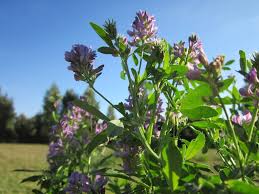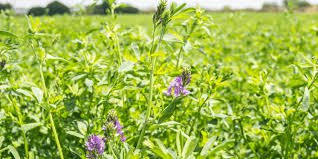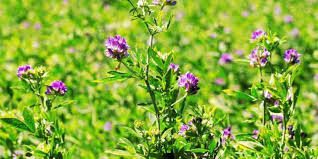Alfalfa is a remarkable plant with many benefits. It’s like a green superhero in the plant kingdom. Imagine a tiny seed growing into a tall and leafy plant – that’s the journey of alfalfa.
This plant is super rich in nutrients. It’s like a treasure chest full of vitamins and minerals that are good for our bodies. People often use alfalfa as food for animals, but did you know that humans can also benefit from it? Yes, indeed!
One of the coolest things about alfalfa is that it’s excellent for the soil. It’s like a natural gardener, making the soil healthier and more fertile. Farmers love alfalfa because it helps other plants around it to grow better. Team player, right?
Now, let’s talk about how alfalfa looks. Picture a bunch of tiny leaves clustered together, creating a vibrant green carpet. It’s like nature’s artwork! And guess what? Some people even call alfalfa the “father of all foods” because it’s so nutritious.
Not just that, alfalfa has a secret power – it’s great for our health. People have been using it for centuries to make herbal remedies. It’s like a green medicine cabinet! Some say alfalfa can help with digestion, and others believe it’s good for the heart. It’s like a tiny plant with a big heart, caring for us from the inside.
Now, let’s talk about animals. Many of our furry friends, like horses and cows, love munching on alfalfa. It’s like a tasty snack for them. And when animals are happy, we’re happy too, right?
Alfalfa is also a great friend to the environment. It’s like a green warrior fighting against soil erosion. Its roots go deep into the ground, holding the soil tight. So, when it rains, the soil stays in place, thanks to alfalfa.
In addition, alfalfa is not just a plant; it’s a green powerhouse. From providing nutrients to the soil, being a nutritious food for animals, to having potential health benefits for humans – alfalfa is a true green hero. So, next time you see this little plant waving in the breeze, remember, it’s not just a bunch of leaves; it’s a green guardian making our world a better place.
Read Also: How to Grow and Care for Potatoes
How to Grow and Care for Alfalfa

Growing alfalfa can be a rewarding experience, whether you’re a seasoned gardener or a beginner. Follow this simple guide to ensure your alfalfa thrives and becomes a green delight in your garden.
1. Planting: Begin by selecting a sunny spot for your alfalfa. These plants love the sunshine, so a location with at least six hours of sunlight a day is ideal. Alfalfa is quite versatile, adapting well to various soil types, but it prefers well-draining soil.
2. Sowing Seeds: Gently sow alfalfa seeds over the prepared soil. You don’t need to bury them too deep – just a light covering will do. Water the area thoroughly to help the seeds settle in. Keep in mind that alfalfa doesn’t like to be waterlogged, so ensure the soil is moist but not overly wet.
3. Watering: Alfalfa is a hardy plant, but it still needs water to grow. Water the plants consistently, especially during dry spells. However, be cautious not to overwater, as this can lead to root rot. Aim for a balance – keeping the soil consistently damp, not soggy.
4. Harvesting: The excitement begins when your alfalfa grows tall and leafy. Harvesting is like giving your plants a haircut. When the plants are about 18 inches tall, you can start cutting. Trim the top portion, leaving a few inches so the plant can regrow. Regular harvesting encourages more growth and ensures a steady supply.
5. Fertilizing: Alfalfa is not a demanding plant when it comes to fertilizers. A balanced, all-purpose fertilizer can be applied during the growing season. Avoid excessive use of nitrogen, as alfalfa is excellent at fixing nitrogen from the air.
6. Companion Planting: Alfalfa is a friendly neighbor to many plants. It’s known to improve soil health and stimulate growth in nearby vegetables. Planting alfalfa alongside other crops can create a beneficial environment, promoting a more fruitful garden.
7. Pests and Diseases: Alfalfa is relatively resistant to pests and diseases, making it an easy-to-care-for plant. However, keep an eye out for aphids, which might occasionally visit. A strong spray of water or introducing beneficial insects can help manage any unwanted guests.
8. Crop Rotation: To maintain soil health, consider rotating your crops. Alfalfa’s deep root system helps break up compacted soil, making it an excellent precursor for other plants in your garden.
9. Winter Care: Alfalfa tends to go dormant in the winter. While it can withstand cold temperatures, a light cover of mulch can provide additional protection during harsh winter conditions.
Follow these straightforward steps, and you’ll be on your way to cultivating a thriving alfalfa garden. With a little care and attention, you’ll soon enjoy the benefits of this versatile and beneficial plant.
Read Also: Types, Importance and Uses of Rice
Uses of Alfalfa

Alfalfa, often hailed as the “father of all foods,” is a remarkably versatile plant with a range of uses that extend beyond its role in agriculture. Let’s explore the diverse ways in which alfalfa enriches our lives:
1. Livestock Feed: Alfalfa is widely recognized as an excellent source of nutrition for livestock, including cows, horses, and goats. Its rich content of vitamins, minerals, and proteins makes it a staple in animal diets, promoting their overall health and productivity.
2. Human Consumption: Humans can also benefit from the nutritional goodness of alfalfa. It can be consumed as sprouts in salads, sandwiches, or smoothies, providing a crunchy texture and a boost of essential nutrients. Some people even use alfalfa supplements for potential health benefits.
3. Soil Enrichment: As a leguminous plant, alfalfa has the unique ability to fix nitrogen from the air into the soil. This not only enhances its own growth but also improves soil fertility. Farmers often plant alfalfa as a cover crop or in rotation to rejuvenate the soil.
4. Herbal Remedies: Alfalfa has a history of being used in traditional herbal medicine. Some believe it may aid in digestion, act as a diuretic, and even support cardiovascular health. While scientific research is ongoing, alfalfa’s potential health benefits continue to spark interest.
5. Green Manure: When alfalfa is grown as a cover crop and plowed back into the soil, it serves as green manure. This enriches the soil with organic matter, enhancing its structure and fertility. It’s a sustainable practice that contributes to healthy and productive agricultural ecosystems.
6. Erosion Control: The deep root system of alfalfa makes it an effective ally in preventing soil erosion. Its extensive roots anchor the soil, reducing the risk of runoff during heavy rains. This erosion control feature makes alfalfa a valuable asset in environmentally conscious farming practices.
7. Bee Forage: Alfalfa’s beautiful purple flowers are not just for show – they attract bees. Beekeepers appreciate alfalfa as a forage crop, providing nectar and pollen for bees. This not only supports honey production but also contributes to the health of pollinator populations.
8. Cover Crop in Orchards and Vineyards:
Alfalfa’s ability to improve soil structure and nutrient levels makes it a beneficial cover crop in orchards and vineyards. It promotes a healthy soil environment for fruit trees and grapevines, aiding in their long-term productivity.
In essence, alfalfa is more than just a green plant waving in the fields; it’s a multi-faceted resource contributing to agriculture, nutrition, and environmental sustainability. From feeding livestock to potentially supporting human health, alfalfa’s uses underscore its importance in various aspects of our lives.
Importance of Alfalfa
Alfalfa, often referred to as the “queen of forages,” holds a pivotal role in agriculture and beyond. Its significance extends across various domains, contributing to the well-being of livestock, soil health, and even human nutrition. Let’s look into the multifaceted importance of alfalfa:
1. Nutrient-Rich Livestock Feed: Alfalfa stands out as a high-quality source of nutrition for livestock. Its lush leaves are packed with essential vitamins, minerals, and proteins, making it a staple in the diets of animals such as cows, horses, and goats. The nutritional content promotes robust health, milk production in dairy cows, and overall livestock productivity.
2. Soil Enrichment and Nitrogen Fixation: Alfalfa’s unique ability to fix nitrogen from the air into the soil is a game-changer for agriculture. This process not only enhances the plant’s growth but also enriches the soil with nitrogen, benefiting subsequent crops in a rotation. Farmers often incorporate alfalfa into their fields to improve soil fertility and structure.
3. Green Manure for Sustainable Farming: As a cover crop, alfalfa serves as green manure when plowed back into the soil. This practice enhances soil organic matter, increases water retention, and improves soil structure. It’s a sustainable agricultural technique that contributes to long-term soil health and productivity.
4. Biodiversity and Bee Forage: Alfalfa’s vibrant purple flowers attract pollinators, especially bees. This not only supports local biodiversity but also aids in pollination for other crops. Beekeepers appreciate alfalfa as a forage crop, contributing to the health of bee populations and honey production.
5. Erosion Control and Sustainable Land Management: The deep root system of alfalfa plays a crucial role in preventing soil erosion. By anchoring the soil and reducing runoff, alfalfa contributes to sustainable land management practices. This erosion control feature makes it an ally in maintaining soil health and preventing environmental degradation.
6. Human Nutrition and Potential Health Benefits: While primarily known as livestock feed, alfalfa has found its way into human diets, particularly as sprouts in salads and other dishes. Some believe that alfalfa may offer health benefits for humans, ranging from digestive support to cardiovascular health. Research in this area continues to uncover its potential contributions to human nutrition.
7. Versatility in Crop Rotation: Alfalfa’s versatility as a rotational crop adds resilience to farming systems. Its deep roots break up compacted soil, improving aeration and water infiltration for subsequent crops. This makes alfalfa an integral part of sustainable crop rotation practices.
In conclusion, the importance of alfalfa in agriculture is akin to that of a green jewel. Its contributions to livestock nutrition, soil health, pollination, and even human nutrition highlight its versatility and significance in sustaining agricultural ecosystems. Alfalfa, with its green presence in fields, continues to be a cornerstone in fostering a healthier and more productive agricultural landscape.
Read Also: Waste Resource Recovery Techniques

